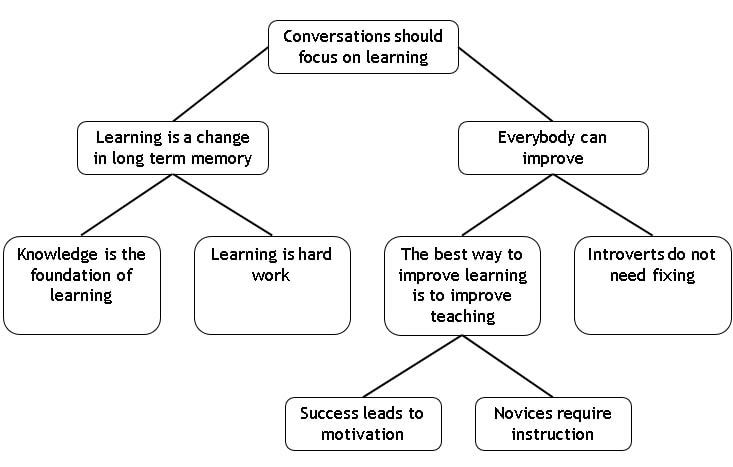There are a lot of things going on in a school, but the primary purpose is to give students the best learning opportunities that we can. For this reason, conversations we have in schools should focus on the learning of the students as much as possible. By keeping a relentless focus on learning within meetings, we don't waste precious time talking about things that will not affect student learning.
The definition offered by Kirschner, Sweller and Clark (2006) is regularly used for learning, but there are also many who argue it does not encompass the whole of learning. For me, this simple definition includes all kinds of changes in our long term memory, and is not only about factual knowledge but also includes behaviours ans skills, and as such, it is a simple yet powerful idea.
By this I mean both students and teachers. In terms of students I work on the principle that every child can achieve if they work hard enough and are given the right support. In my mind there are no 'weak' or low ability kids, but rather those who need a bit more time, or have a lack of background knowledge. If these needs are addressed, then all students can succeed. I believe that all students, with the exception of the few with very severe SEND, can pass GCSE Maths, for example.
We learn new things based on what we already know. And this knowledge goes through stages of inflexibility to fully transferable. This is a natural progression. Skills, such as critical thinking, are domain dependent and rely heavily on knowledge. For example, to be able to analyse the causes of World War 2, you need to know a lot about the lead up to World War 2. With this knowledge in place, you can develop the skill of analysing Historical events.
As much as I believe that everybody can learn, and that they will be more motivated to learn if they are successful, I also believe that learning anything is hard work. Nothing that is worth anything in life comes easy and there is little else that is more worthwhile than learning new things.
Of course we all learn things without being taught (through exposure, or more indirect methods of teaching, such as reading), but high quality teaching is the best way to improve the education of large populations of children. This assumption is independent of beliefs about effective pedagogies, because if you believe in constructivist theories, there is an important role for the teacher in guiding the students and if you believe in a more explicit approach, then improving explanations and other aspects of instruction are important. Good teaching in any model of education will be better than bad teaching of any other model.
This is a more subtle assumption than the others in terms of education, but the reality is that schools are designed for extroverts, and when there is a quiet child they are often encouraged to 'participate more' or be more active in group work.
We are motivated by, and enjoy, subjects that we are good at. On a personal level I always enjoyed Maths as I was good at it. Similarly swimming. But I hated music as I wasn't very good at it (although I now believe I could have been if I had put in the effort, as I talk about above).
We all require instruction when we are learning something new (that is we are a novice in that domain). From a teacher, a video, by reading a book. There are lots of ways to receive that instruction, but it is necessary. Learning through discovery is incredibly inefficient for the novice learner, and prone to creating misconceptions.

 RSS Feed
RSS Feed
